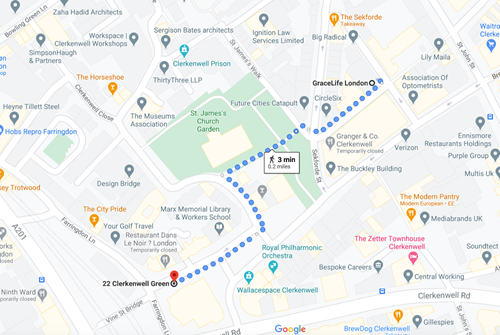Dear Church,
Due to the new lockdown legislation, it is now illegal for us to gather inside or outside for public worship.
The elders believe that we are duty-bound in these circumstances to continue to gather based on reasons given in explanation of the statement below.
We are unable to use the chapel as we do not own it, and our license to occupy it forbids us from using the chapel to do anything illegal.
Therefore, we have decided to gather outside in Clerkenwell Green, just 3 minutes' walk from the chapel (see the map opposite).
We will attempt to Livestream for those who cannot make it.
For those attending, please know that this is now illegal, and anyone attending could face a fine of £100, and the organisers (GLL) may face a fine of £10,000.
We as elders realise the consequences, but as you will understand from the statement below, feel it is necessary to obey God first and foremost at this point.
Statement from the Elders Regarding the New Lockdown and Our Response as a Church
From the Bible, we recognise four biblical duties that need to be considered in this situation which can lead to competing concerns.
- The duty to honour God by obeying His instructions (Hebrews 10:25; Matthew 28; 1 Corinthians 12; 14 etc.).
- This would lead us to be very concerned that if we give up meeting as a church (without Biblical reasons) we would dishonour Him.
- The duty to love our neighbours by not doing something that would put a stumbling block in the way of them hearing the gospel (1 Corinthians 9).
- This would make us concerned that if we continue meeting and our actions are not understood, their offence at our action might make it harder for them to hear the good news from us.
- The duty to honour the governing authorities by obeying their commands (Romans 13; 1 Peter 2).
- This would lead us to be concerned not to do anything which disobeys the clear instructions of those in authority, unless obedience to the authorities conflicts with obedience to God
- The duty not to recklessly endanger life (Deuteronomy 22:8).
- This would lead us to be concerned that by meeting together in a pandemic we might carelessly lead to the deaths of others.
How we have sought to apply these biblical principles and resolve the conflict between these competing concerns:
1. Being clear about the nature of our duty to obey the authorities.
If the authorities command us not to do something God requires (gather as a church), we must not obey simply because they say so. We would only ever righteously comply with such commands if God Himself would have us do so.
For instance, when the government commands us not to hold church gatherings because there is an unacceptable, real-and-present danger to life from our gathering, we would cease performing one duty (gathering) in order to obey God in another duty (not recklessly endangering life). This is switching duties, not moving from obedience to disobedience.
In such circumstances, by complying, we are not saying that we believe the government can command us to disobey God. We simply accept that the government has pointed out a situation in which God Himself would also require us to cease from one duty (gathering) that we might obey another duty (not recklessly endangering life).
2. Being clear about the nature of our duty not to recklessly endanger life.
For us to stop gathering as a church, we would have to be convinced that to gather would indeed present an unacceptable, clear-and-present danger to life. Obviously, when that is the case, it would be right to heed the government’s instructions and cease church gatherings temporarily until the danger has passed.
However, when government warnings lose their credibility, we are not duty-bound to obey them if their commands conflict with our duty to obey God (in this case to gather and worship together). Our duty not to recklessly endanger life means we have a duty as elders to make some assessment of the claims about the dangers we face.
In this case, along with other church leaders, we are not convinced about the credibility of the government’s warnings that the danger to life is unacceptably high, and thus we do not believe we are recklessly endangering life by gathering as a church.
3. Being clear about the nature of our duty to love our neighbours.
We realise that most will probably not understand our actions, and some may misconstrue them, should we gather.
From 1 Corinthians 9, we understand that we are duty-bound to go as far as we can in giving up our freedoms so that we don’t put a stumbling block in our neighbours' way.
However, we are never commanded to give up obedience to God in order to win our neighbours.
Additionally, it has always been the case that those who don’t yet know Christ will misunderstand and misconstrue many of the decisions we make as believers with respect to our obedience to God. In the history of the Church, our love to our neighbours has often best been expressed in the context of our willingness to suffer rather than disobey God.
While we would never wish to needlessly cause offence, our commitment to obedience to God is not a “needless” cause of offence, even if it is misunderstood or misrepresented.
4. Being clear about our duty to honour God by obeying his instructions.
The requirement for the church to gather to worship is clear in Scripture. We are commanded not to forsake the assembling of ourselves together (Hebrews 10:25) which indicates that “gathering” is not an optional duty for believers.
It is within that gathered context, that many other duties are fulfilled, such as: preaching/teaching; baptising; serving each other with our spiritual gifts; obeying the one-another commands; the “public” reading of scripture; corporate prayer; the Lord’s Table.
Conclusion: Since our default setting as Christians, must be to gather out of obedience to God, and since the government warnings about the dangers we face have sadly lost credibility, we believe we must obey God rather than men, and continue to gather for worship, accepting the consequences.
How we pray: Paul instructs the church in Ephesus to pray for their leaders (1 Timothy 2:1,2). Ours have a very difficult job. While we don’t agree with specific decisions, we do want to have a genuinely honouring attitude toward our leaders and pray for their salvation and wisdom.
How we carry ourselves: In the same exhortation Paul states the outcome of this prayer. “that we may lead a peaceful and quiet life, godly and dignified in every way.” We don’t want to draw undue attention as we come and go from our gathering. We don’t want to use belittling rhetoric in social media. We are not gathering in boisterous protest; we want to carry ourselves with dignity. We ought, therefore, to remain diligent about social distancing, and other protocols as we come and go.

